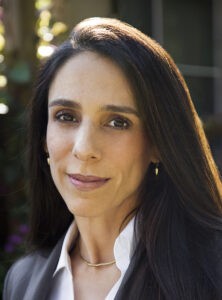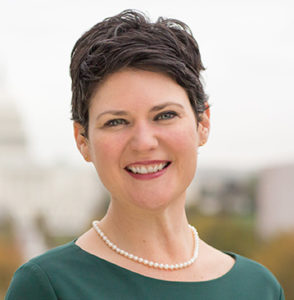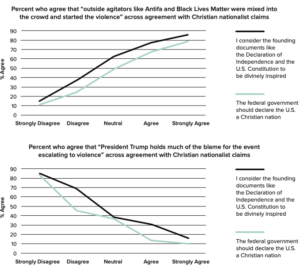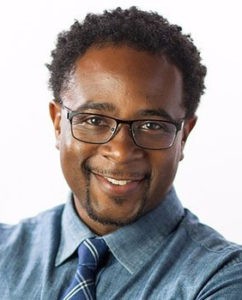
BJC offers free downloadable report explaining January 6 in light of Christian nationalism
A new 63-page report takes a deep dive into the role of Christian nationalism in the Jan. 6, 2021, insurrection at the U.S. Capitol and the ongoing, once-underground movement to overturn constitutional democracy in favor of government for and by conservative Christians.
The report — “Christian Nationalism and the January 6 Insurrection” — was produced by Baptist Joint Committee for Religious Liberty and the Freedom From Religion Foundation. It includes essays by notable academic figures on topics ranging from a definition of Christian nationalism to suggested action steps to combat it.
Several contributors to the report spoke at a Feb. 9 webinar to introduce the new resource. Together, they warned that the subversive rhetoric and actions of Christian nationalists have become increasingly sinister and alarming since Jan. 6.
Rewriting history
The situation is so alarming, they said, that Americans who stand up against the lie that the 2020 election was stolen from Donald Trump and who disagree with the unconstitutional idea that the United States should be an exclusively Christian nation are now being labeled as ungodly and evil at extremist rallies and through videos, websites and blogs.

Since 2021, Christian nationalist groups have resorted to more dehumanizing depictions of political opponents by “mainstreaming the idea that Democratic organizations are demonic organizations and ‘if we don’t win elections we will go under the control of the enemy,’” said Katherine Stewart, a contributor to the report and author of The Power Worshippers: Inside the Dangerous Rise of Religious Nationalism.
Also on the rise during the past year has been the use of terms such as “freedom fighters” and “martyrs” to describe extremists’ views of the Jan. 6 conspirators and rioters, said Andrew Seidel, a report contributor, constitutional attorney and director of strategic response with the Freedom From Religion Foundation.

Christian nationalists also have held firm to the claim that their movement is willed by God, a position that leaves no room for reflection or repentance. “Instead, it’s a doubling down” on extreme political and theological beliefs, said Seidel, author of The Founding Myth: Why Christian Nationalism is Un-American.
The report and panel
Stewart and Seidel were joined on the panel by fellow report contributors Jemar Tisby, a historian of religion and race and author of The Color of Compromise: The Truth about the American Church’s Complicity in Racism; BJC Executive Director and event moderator Amanda Tyler; and sociologists Samuel Perry and Andrew Whitehead, co-authors of Taking America Back for God: Christian Nationalism in the United States.
The free downloadable report defines Christian nationalism as “a political ideology and cultural framework that seeks to merge American and Christian identities, distorting both the Christian faith and America’s constitutional democracy.”

Further, the introduction written by Tyler explains: “Christian nationalism relies on the mythological founding of the United States as a ‘Christian nation,’ singled out for God’s providence in order to fulfill God’s purposes on earth. Christian nationalism demands a privileged place for Christianity in public life, buttressed by the active support of government at all levels.”
Also known as white Christian nationalism, the movement is less about adhering to an orthodox Christianity than it is an ideology and “ethno-cultural political orientation” currently energized by a belief the 2020 election was stolen. It also displays a disturbing comfort level with political violence to achieve and maintain power and prone to conspiratorial thinking, Whitehead added.
The movement also espouses moral traditionalism and favors hierarchical social order and militarism, he said. That provided the theological and political cover for the Jan. 6 insurrectionists.
Reshaping views
Perry added that research completed since the writing of the report reveals Christian nationalism narratives are successfully reshaping some Americans’ views of the insurrectionists, resulting in a 20% drop in the those who believe rioters should be prosecuted.

The emerging reinterpretation of events, including claims that Antifa and Black Lives Matter agitators — instead of Donald Trump — fomented the Jan. 6 attack, leaves “open the door to future violence,” Perry said.
Christian nationalists laid the groundwork for the riots well before the 2020 election, Stewart said. With help from conservative media outlets, they created an “information bubble where a large flock of supporters can be separated from the facts in a state of disinformation.”
Another approach was to promote “a sense of persecution and resentment among the rank-and-file” mixed with language about being in “a battle against tyranny and demonic forces” mixed with claims that “the Bible will be outlawed” if conservatives are unsuccessful, she said.
Seeking power for themselves
Christian nationalist ideology also revolves around the premise that the legitimacy of the U.S. government derives from a conservative Christian political perspective and eschews the notion of “a government by and for the people.”
 Leaders of the movement are primarily seeking power for themselves and their allies and policies that support approved religious and political points of view, Stewart said. “The movement is leadership driven and organization driven. It is not driven by the rank-and-file.”
Leaders of the movement are primarily seeking power for themselves and their allies and policies that support approved religious and political points of view, Stewart said. “The movement is leadership driven and organization driven. It is not driven by the rank-and-file.”
A series of rallies leading up to the Capitol attack gave warning the riot was coming, Seidel asserted. Those events involved many of the same organizers and participants of the insurrection and dripped with violent biblical imagery in word and action.
References were made to the Old Testament battle of Jericho, with participants marching around government buildings — including the U.S. Capitol — invoking the Israelites’ conquest of Canaan.
Some participating ministers performed exorcisms to free the nation of liberal politicians and policies while evangelist and Trump supporter Paula White recited the Lord’s Prayer adding the word “America.”
“Sometimes I wonder how we could have been surprised that day,” Seidel said about Jan. 6.
How to fight back
While expressing deep concern about the future actions of white Christian nationalism, he added that it can be beaten by pushing back against disinformation and by Americans committing to the separation of church and state.

The Black church and African American history offer models of how U.S. citizens can support democracy, Tisby said.
From the time they were introduced to Christianity as slaves, African Americans understood they had civic and human rights and they began to demand to exercise those rights, he explained. The church that evolved from that experience has fought for the political freedoms its members have won, and which are anathema to white Christian nationalists.
While Christian nationalists have a “very exclusionary, xenophobic and racist understanding” of the religion, “others have understood faith as pointing them to multiracial democracy,” Tisby said.
That’s an important lesson, given the way Christian nationalists are attacking Critical Race Theory, dissenters within churches, public schools and local, state and national government, he added.
Opponents of white Christian nationalism must avoid the temptation to look for solutions in white spaces only, Tisby continued. Instead, the nation should look to “marginalized people groups as actual leaders in the struggle.”
Counter movements such as Christians Against Christian Nationalism are another way Americans support a constitutional government, Tyler said, referencing a network coordinated by BJC. “We need a broad coalition to work together against a common threat.”
Annie Laurie Gaylor, co-president of the Freedom From Religion Foundation, added that the national motto, E Pluribus Unum — “out of many, one” — holds the key to successfully opposing white Christian nationalism because it suggests people of faith, and of no faith, can co-exist.
Related articles:
New website illustrates and interprets how religion intertwined with events of January 6
Christian symbols and sedition at the Capitol: The church has work to do | Opinion by Rhonda Abbott Blevins
If you’re paying attention to Christian nationalism, you won’t be shocked by Michael Flynn’s call for ‘one religion under God’ | Opinion by Amanda Tyler
Leave a Reply
You must be logged in to post a comment.

